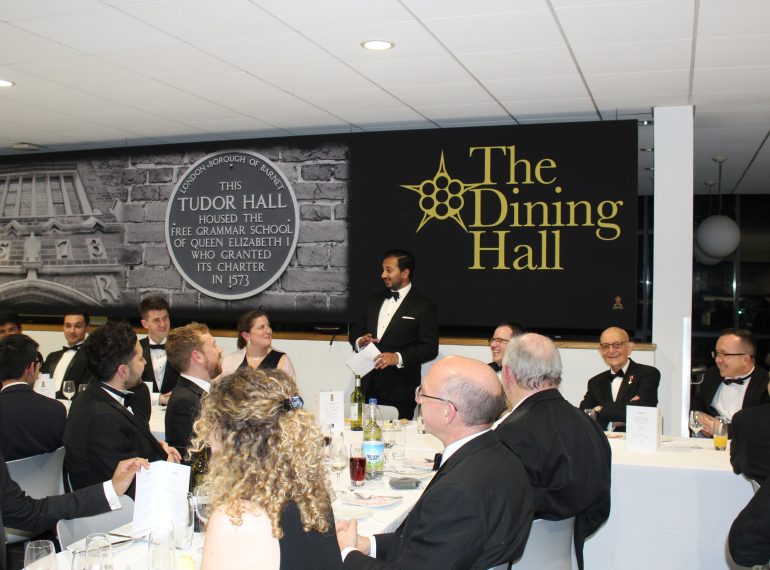
With the recent media furore over Facebook and Cambridge Analytica, the topic of this year’s Elizabethan Union Dinner Debate held particular resonance.
The Old Elizabethans secured a decisive, although not totally one-sided, victory, as they and a pair of sixth-formers debated the motion: This House believes that in the digital age we should not expect our online activities to remain private.
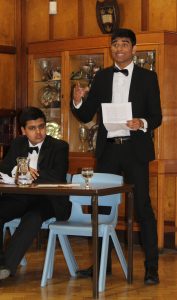 Pupils Akshat Sharma and Tej Mehta put forward the motion for the 53rd annual debate, which was held on the day of the 445th anniversary of the founding of the School. It was opposed by Jonathan Hollingsworth, who opened, with support from Pravin Swamy (both OEs 2006-2013).
Pupils Akshat Sharma and Tej Mehta put forward the motion for the 53rd annual debate, which was held on the day of the 445th anniversary of the founding of the School. It was opposed by Jonathan Hollingsworth, who opened, with support from Pravin Swamy (both OEs 2006-2013).
Headmaster Neil Enright said: “The debate itself was a typically lively and good-humoured affair. The whole event serves to help prepare boys for handling similar such formal, but social, occasions as they progress through university, their careers and life more broadly.”
Captain of the School Aashish Khimasia proposed the customary toasts to Her Majesty, the Queen, and The Pious Memory of Queen Elizabeth I, whilst Ross Lima (OE 1995-2002) proposed the toast to The Elizabethan Union.
Ross read Law at Sheffield and now works for Shell as Lead Legal Counsel for the sale of catalysts across large areas of the globe. In his speech, he reminisced about his first day at QE and meeting friends Laurence Burrows and Panicos Petrou, both of whom attended the dinner debate as his guests, along with Ross’s wife, Sarah. He remembered how the then-Headmaster, Eamonn Harris, told them to look around at the prefects: “He told us we were wearing the same blazers, but we hadn’t earned ours yet.” Looking at his Dinner Debate audience, Ross said: “You are now in the same position as those very boys that I looked up to on that day, and through your achievements at this School you have earned the right to wear that blazer.”
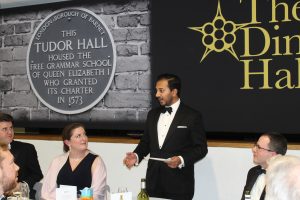
He spoke of the challenges the boys have already faced in their School careers and encouraged them to continue to seek out new challenges and opportunities, and to learn to overcome their fears.
The indicative vote at the outset indicated that the floor was leaning against the motion.
The debate began with Akshat putting forward the proposal. He and seconder Tej set out their case that it was, in fact, a reality that our online activities are not private – using state surveillance, as an example. They also argued the importance of being aware of how others use the data they hold, via social media or online gaming. They put forward the view that if people agree to the terms of surveys and ‘apps’ they use, then companies like Cambridge Analytica had, in law, not necessarily done anything wrong.
They also expounded the case for the positives of monitoring online activities, for the purposes of detecting and preventing crime and acts of terror.
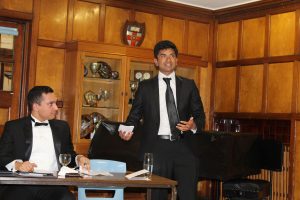 The opposition countered these arguments, claiming the price of giving up our online privacy would be to give up part of our humanity, including our freedom of speech. Facebook came in for criticism, and the alumni said that even Mark Zuckerberg has now opined that such companies need regulating. They argued that people would not expect more traditional forms of communication – the Royal Mail or faxes, for example – to be open to others to view, so why should the internet be any different?
The opposition countered these arguments, claiming the price of giving up our online privacy would be to give up part of our humanity, including our freedom of speech. Facebook came in for criticism, and the alumni said that even Mark Zuckerberg has now opined that such companies need regulating. They argued that people would not expect more traditional forms of communication – the Royal Mail or faxes, for example – to be open to others to view, so why should the internet be any different?
They also questioned whether the good citizens represented on the floor should be subjected to privacy breaches by the state in the name of security, advocating a higher threshold. They proposed a series of policy interventions to ensure better data protection online.
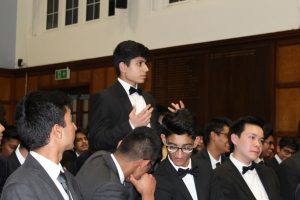 The floor debate saw enthusiastic contributions from Year 12 speakers and guests. These ranged from the question of how to monitor and deal with the terrorist threat, through to the different expectations there should be users in terms of the sharing of social media posts and messages between, on the one hand celebrities (and those who court social media attention) and, on the other, ordinary users. They also raised the already-strict financial and criminal penalties that exist for those who breach data laws.
The floor debate saw enthusiastic contributions from Year 12 speakers and guests. These ranged from the question of how to monitor and deal with the terrorist threat, through to the different expectations there should be users in terms of the sharing of social media posts and messages between, on the one hand celebrities (and those who court social media attention) and, on the other, ordinary users. They also raised the already-strict financial and criminal penalties that exist for those who breach data laws.
The three-course meal started with leek and potato soup. There was a choice of main course between vegetarian tart and salmon, which was served with crushed new potatoes, green beans and tomato and basil sauce. Dessert was lemon and lime tart.

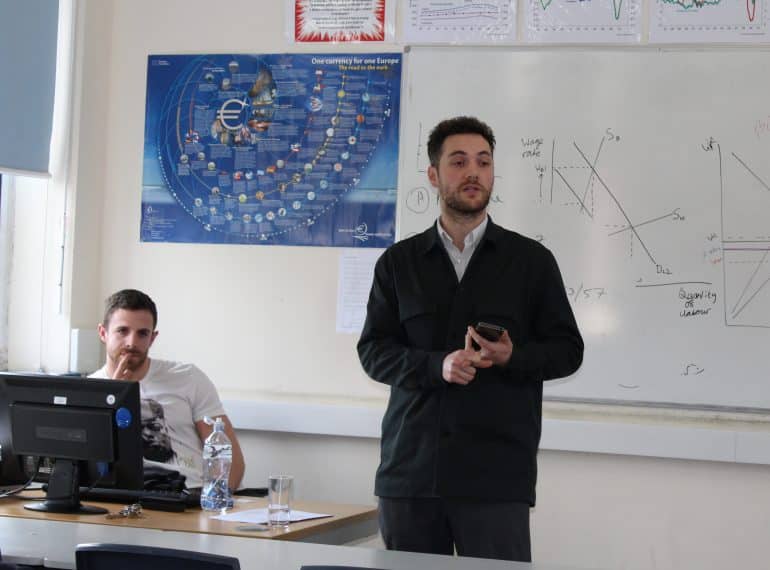
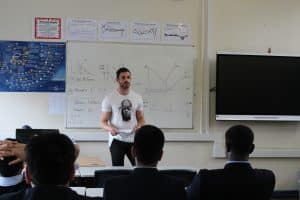 Max completed a three-month unpaid internship as a football consultant, before being offered a full-time role as an FA Registered Intermediary with Sidekick Management Ltd. “It was very hard to break into,” said Max. “I had no contacts and little industry experience. In the beginning, I was constantly being asked which footballers I already had on the books, which was tough when I didn’t know any personally.” But he successfully signed two players to the agency within his first three months and, in doing so, forged sustainable relationships with a number of academy directors, coaches and a chief executive.
Max completed a three-month unpaid internship as a football consultant, before being offered a full-time role as an FA Registered Intermediary with Sidekick Management Ltd. “It was very hard to break into,” said Max. “I had no contacts and little industry experience. In the beginning, I was constantly being asked which footballers I already had on the books, which was tough when I didn’t know any personally.” But he successfully signed two players to the agency within his first three months and, in doing so, forged sustainable relationships with a number of academy directors, coaches and a chief executive.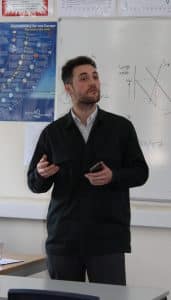 “I am an experienced music curator and influencer across all levels of the industry, including radio, festivals, labels and online publishing. As co-founder of www.stampthewax.com, I have grown the online music platform to become one of the key UK influencers in underground music. As an original member of [disc jockey and record label owner] Gilles Peterson’s Worldwide FM, I played a key role in the development of an award-winning online radio station.”
“I am an experienced music curator and influencer across all levels of the industry, including radio, festivals, labels and online publishing. As co-founder of www.stampthewax.com, I have grown the online music platform to become one of the key UK influencers in underground music. As an original member of [disc jockey and record label owner] Gilles Peterson’s Worldwide FM, I played a key role in the development of an award-winning online radio station.”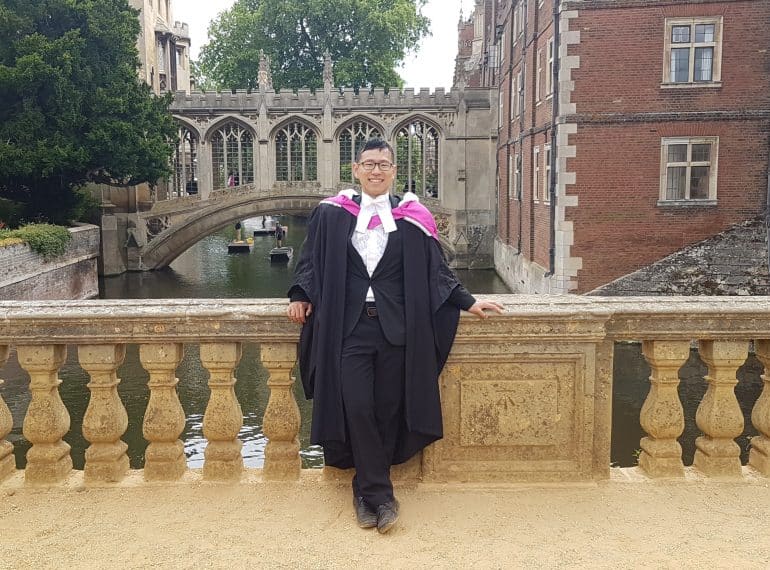
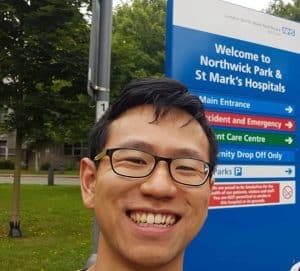 Jin joined Northwick Park in August as the most junior (‘Foundation Year 1’) doctor in his team. “Working as a doctor has itself been another steep jump from university. I have had some very good moments with patients and members of the team, tempered by moments of acute stress and uncertainty. But overall it has been a great and humbling experience, packed (perhaps surprisingly) with lots of laughter and hilarity. After six years in Cambridge, it is nice to be back in London!”
Jin joined Northwick Park in August as the most junior (‘Foundation Year 1’) doctor in his team. “Working as a doctor has itself been another steep jump from university. I have had some very good moments with patients and members of the team, tempered by moments of acute stress and uncertainty. But overall it has been a great and humbling experience, packed (perhaps surprisingly) with lots of laughter and hilarity. After six years in Cambridge, it is nice to be back in London!”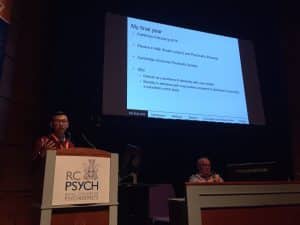 After becoming interested in the mind, Jin did his Part II (intercalated degree) in Experimental Psychology. “In my final year, I worked with Professor John O’Brien and Dr Annabel Price on a novel research project using anonymised electronic case records to identify differences between the survival of patients with two different types of dementia: dementia with Lewy bodies and Alzheimer’s dementia. I was selected for an oral presentation of this research at the International Congress of the Royal College of Psychiatrists, and the research paper has just been accepted for publication in the BMJ Open journal.
After becoming interested in the mind, Jin did his Part II (intercalated degree) in Experimental Psychology. “In my final year, I worked with Professor John O’Brien and Dr Annabel Price on a novel research project using anonymised electronic case records to identify differences between the survival of patients with two different types of dementia: dementia with Lewy bodies and Alzheimer’s dementia. I was selected for an oral presentation of this research at the International Congress of the Royal College of Psychiatrists, and the research paper has just been accepted for publication in the BMJ Open journal.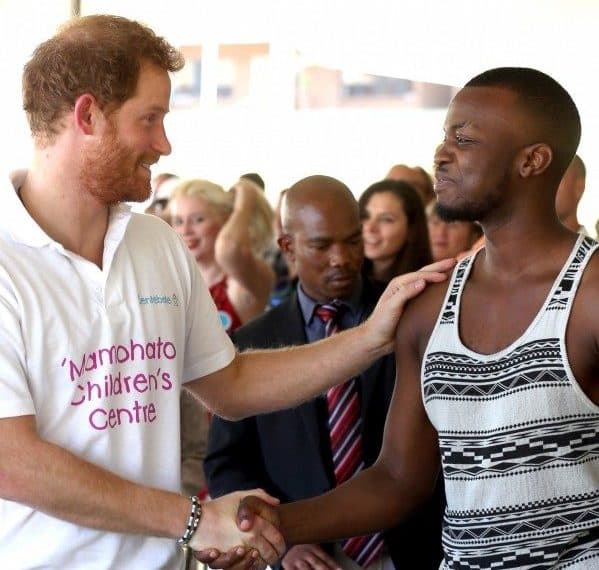
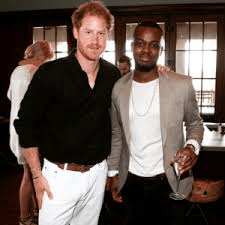 “I have seen the kids react when Harry is around – they really take to him. Harry seems to have a way with the kids, man!” said George, who stated that the importance of the charity lies in the fact that there is still a stigma surrounding HIV.
“I have seen the kids react when Harry is around – they really take to him. Harry seems to have a way with the kids, man!” said George, who stated that the importance of the charity lies in the fact that there is still a stigma surrounding HIV. During the documentary, George spoke out about the fact that the ethnic background of Meghan Markle has attracted comment in some quarters: “Why should it be controversial that someone is mixed-race? What’s the issue?”
During the documentary, George spoke out about the fact that the ethnic background of Meghan Markle has attracted comment in some quarters: “Why should it be controversial that someone is mixed-race? What’s the issue?”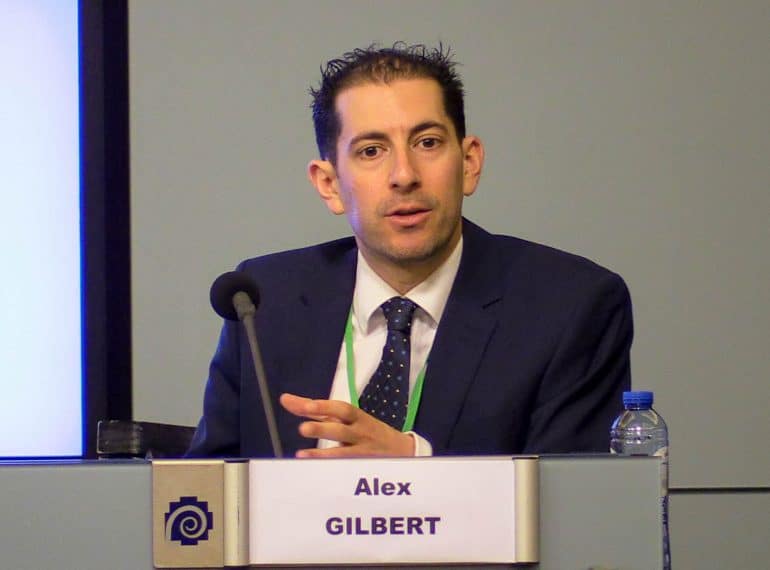
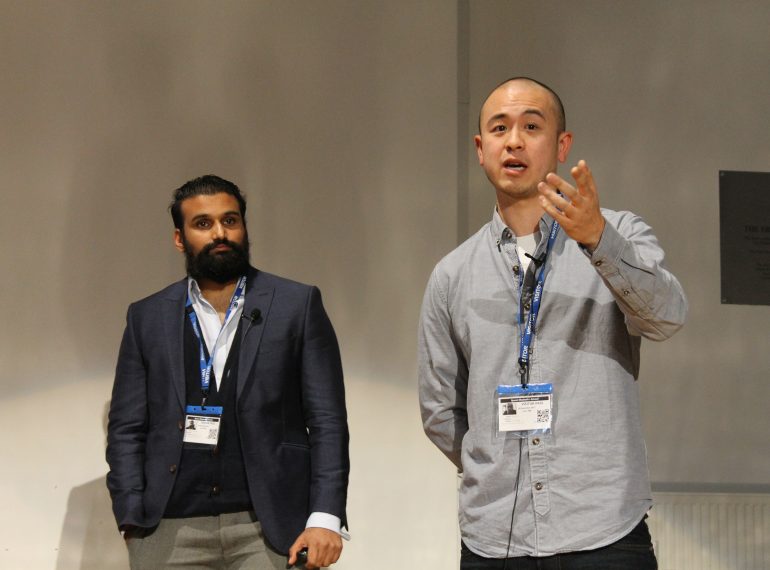
 bles, a 156-mile ultra-marathon across the Sahara Desert.
bles, a 156-mile ultra-marathon across the Sahara Desert.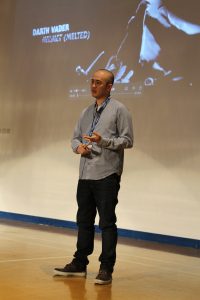 So he took up long-distance cycling, scuba-diving and marathon-running. And while he did not see himself as competing with fellow participants, he did draw inspiration from them, such as his companion on a bike ride from London to Barcelona – a man who had cystic fibrosis and was on the lung transplant register.
So he took up long-distance cycling, scuba-diving and marathon-running. And while he did not see himself as competing with fellow participants, he did draw inspiration from them, such as his companion on a bike ride from London to Barcelona – a man who had cystic fibrosis and was on the lung transplant register. “A lot of the time you were on your own in the desert with a map and some markers, and you have to draw on everything you have.” He likened it to the feeling of isolation around examinations when your classmates are no longer there and you have got to do it yourself.
“A lot of the time you were on your own in the desert with a map and some markers, and you have to draw on everything you have.” He likened it to the feeling of isolation around examinations when your classmates are no longer there and you have got to do it yourself. He also spoke about not needing to know what you want to do when at school and the merits of taking a different path from the norm. Johnny took Photography at A-level at QE, taught by Alison Lefteri, who is still in the School’s Art department. “Trust in your own beliefs and what you are interested in – it doesn’t matter if it’s not like what others are doing. Opportunities will arise,” he told the boys. He found a passion for photography, developing his skills and discovering an interest in documentary-style photography at university. Eventually, however, he moved into film and found he loved that even more.
He also spoke about not needing to know what you want to do when at school and the merits of taking a different path from the norm. Johnny took Photography at A-level at QE, taught by Alison Lefteri, who is still in the School’s Art department. “Trust in your own beliefs and what you are interested in – it doesn’t matter if it’s not like what others are doing. Opportunities will arise,” he told the boys. He found a passion for photography, developing his skills and discovering an interest in documentary-style photography at university. Eventually, however, he moved into film and found he loved that even more.